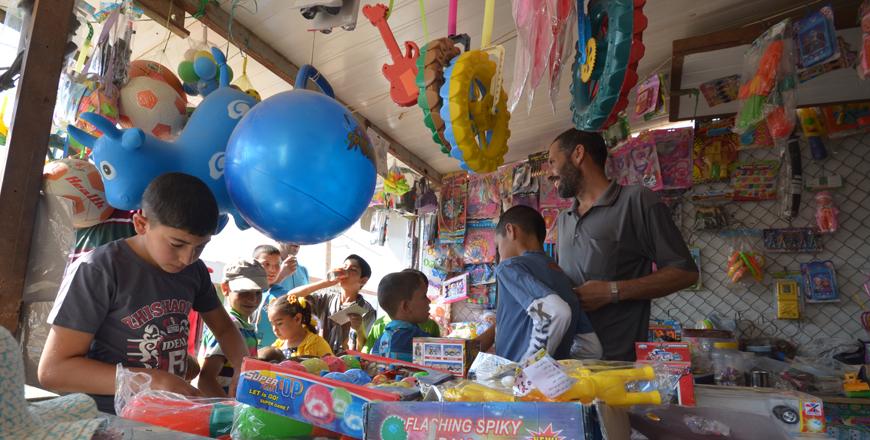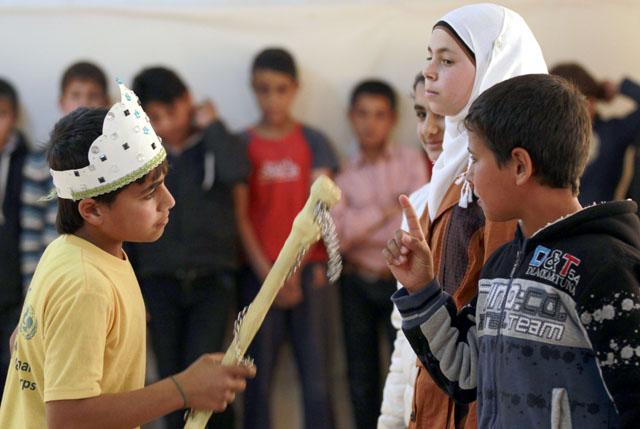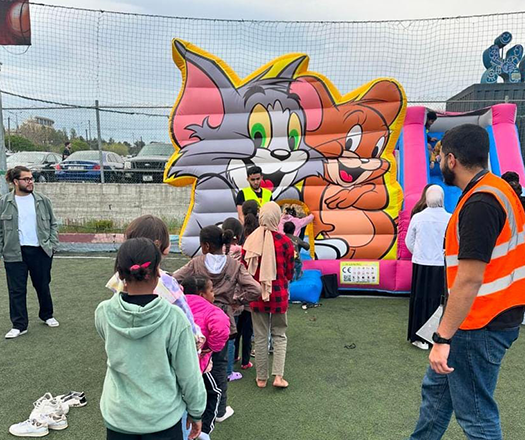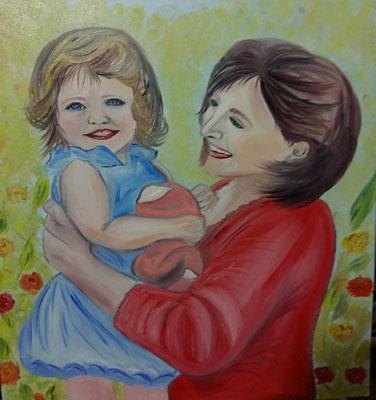You are here
Undeterred by circumstances, Zaatari children still find joy in Eid
By Muath Freij - Jul 20,2015 - Last updated at Jul 20,2015

Children at the Zaatari Refugee Camp, some 90km northeast of Amman, spend the first day of Eid Al Fitr shopping for toys and playing outside (Photo by Muath Freij)
ZAATARI REFUGEE CAMP –– Like any child of a Muslim family in Jordan, Tuqa woke up in the early morning on the first day of Eid Al Fitr, wore her new clothes and went out with her siblings.
But unlike many others, Tuqa spent the Eid away from her country not by choice, having had to take refuge in the Kingdom along with her family to escape the violence in her Syrian hometown of Daraa.
But the eight-year-old refuses to let that bring her down.
She is still attached to the Eid “rituals” she used to follow back home, wearing her finest clothes and going out to buy toys and ice cream.
“I love Eid and I want to enjoy it!” Tuqa insists.
Just like Tuqa, children at the Mafraq camp, some 90km northeast of Amman, were the only ones who felt the joy of Eid.
The Zaatari camp, established in 2012, is home to 81,405 registered Syrian refugees, including around 43,417 children, according to the UNHCR website.
Since the early morning of the first day of the Muslim feast marking the end of Ramadan, vendors were selling sweets, candy and toys to bring the semblance of Eid atmosphere to the camp.
Syrian children were going around the stores, searching for their favourite toys. Many of them also went to the playgrounds with their friends to spend the holiday playing.
Ahmad Ismail, one of the vendors, said Eid means the world for children at the camp.
“They collect their eidiyeh [cash gifts given to children and female relatives during Eid] and come to buy toys,” he told The Jordan Times while decorating his store.
Ismail noted that most vendors have a duty during Eid to make children happy.
“Children should not be prevented from living their childhood and enjoying Eid even in these circumstances. Whatever the child demands, you have to provide as much as possible.”
Daraa-born Abu Haidar, another toy seller, said Eid at the camp is for the children.
“Children make Eid beautiful as they go around buying toys, playing outside and spreading joy. They want to forget the sufferings they endured in Syria due to the violence, so they go out to enjoy themselves and remember the beautiful times back home.”
Abu Haidar noted that regardless of the atmosphere in the camp, it is not as exciting as it used to be in Syria.
“Though we are here in our second home in Jordan, I still miss my home, the tree under whose shade I used to sit with my friends,” he said.
“But I still find joy in the fact that we managed to make children smile after they witnessed horrible scenes and nightmares.”
But Abu Yaser, a Syrian refugee from Daraa who has been in the camp for three years, still feels like a stranger during Eid in Zaatari.
“We are far from our home and friends. In the past, we used to visit our relatives and friends back home and now we are all displaced and I don’t know anything about them,” he added.
Abu Yaser said “each family has a martyr” and no one feels the joy of Eid.
“We hope that we will spend the next Eid Al Fitr at our home in Syria.”
Related Articles
Under a huge white tent in the desert dust of Jordan, 100 Syrian refugee children, their own lives blighted, rehearse King Lear, one of Shakespeare’s great tragedies.
AMMAN — The Shabab Al Khair (Youth of Goodness) initiative, in cooperation with the “Children of Gaza” Association, organised an iftar for o
ZAATARI, Mafraq — Determined to change the image of her fellow Syrians in the Zaatari Refugee Camp as “uneducated and unskilled”, one woman
















